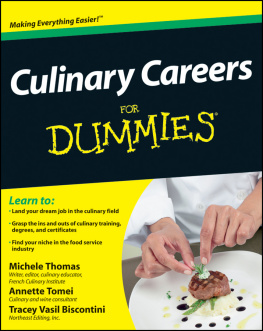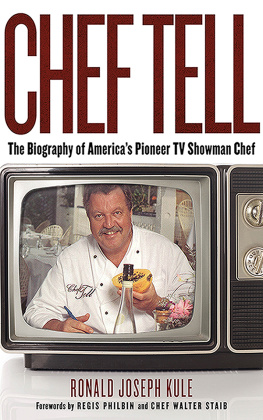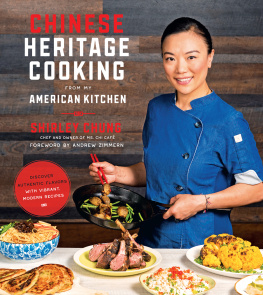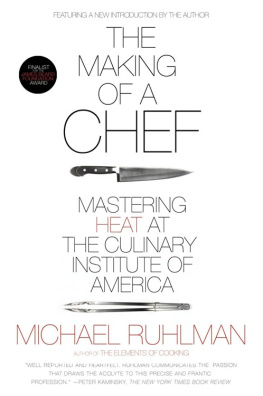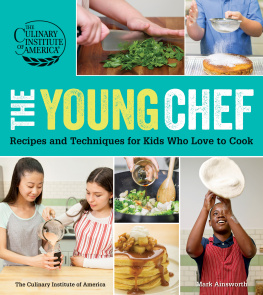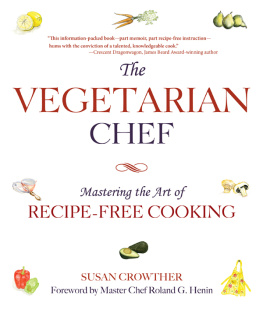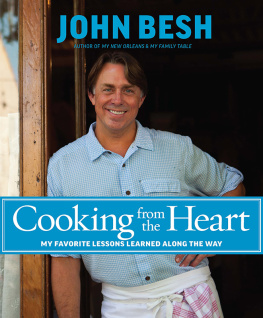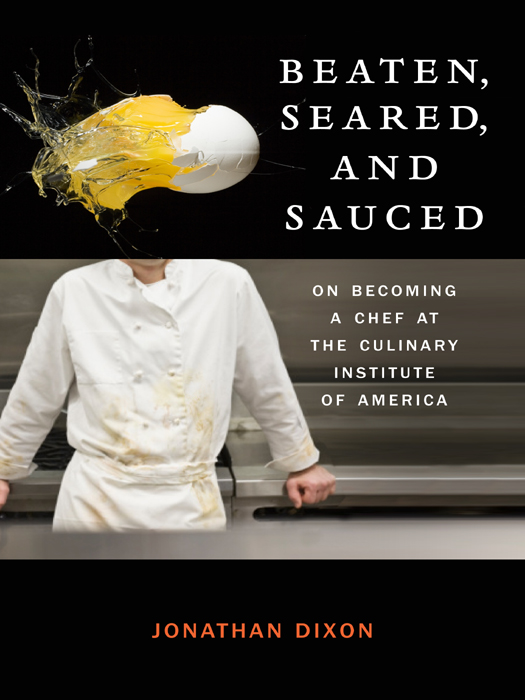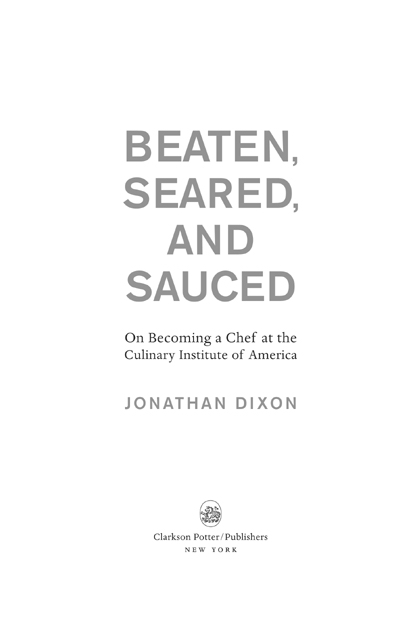The people and stories portrayed in this book are all true; however, the author has changed the names of a few of those people in an effort to minimize intrusions on their privacy.
Copyright 2011 by Jonathan Dixon
All rights reserved.
Published in the United States by Clarkson Potter/Publishers, an imprint of the Crown Publishing Group, a division of Random House, Inc., New York.
www.crownpublishing.com
www.clarksonpotter.com
CLARKSON POTTER is a trademark and POTTER with colophon is a registered trademark of Random House, Inc.
Library of Congress Cataloging-in-Publication Data
Dixon, Jonathan.
Beaten, seared, and sauced / Jonathan Dixon. 1st ed.
p. cm.
1. Dixon, Jonathan. 2. CooksUnited StatesBiography.
3. Culinary Institute of America. I. Title.
TX649.D59 A3 2011
641.5092dc22 2010040145
[B]
eISBN: 978-0-307-95334-6
Design by Stephanie Huntwork
Jacket photographs Jetta Productions; David Atkinson (chef);
Rubberball/Mike Kemp (egg)
v3.1
For Jane and Peter Dixon
And for Nelly Reifler
ACKNOWLEDGMENTS
T HANK YOU TO D AVE Larabell, my agent. Thank you to Rica Allannic, my editor. I owe both of you a huge debt of gratitude.
And thank you to everyone who directly impacted this entire experience: Adam Kuban, Gail Rundle, John J. Singer Jr., Barbara Ryan, Anna Dixon Lassoff, Dave Lassoff, Sam and Niloufer Reifler, Jenefer Shute, Susan Daitch, Lauren Cerand, Lesley Porcelli, Deborah Finkel, Adam Walker, Gerard Viverito, Robert Perillo, Irena Chalmers, Ben Smith, Lee Greenfeld, Chesley Hicks, Lacy Shutz, Ian Bickford, Dwayne Motley, Laura Wallis, Jay Cooper, Jill Olson, Elizabeth Albert, Erik Satre, Andrew Lindsay Cohen, Sarah Prouty, Ryan Carey, all the Pownal WW crew, and Bob Miller.
And of course, Dan C., Margo G., Stephen P., Bruce P., Micah M., Rocco P., Gabi C., Jessica S., Max S., Brian T., Carol J., Jackie Y., Mike O., Diego F., Greg L., Jeremy D., Kevin S., Zach L., Natasha M., Sam G., Sammy S., Gio A., Mike B., Sasha G., Jeff S., Sitti S., Evan B., Dimitri K., Joe C., and Leo R.: gracias to all of you.
I want to acknowledge Michael Ruhlmans excellent book, The Making of a Chef, which looked at the day to day workings of the Culinary Institute of Americas curriculum with a more microscopic, objective eye than I achieved in mine. My goal was to supplement Michael Ruhlman and not to supplant him.
Contents
M Y THROAT FELT TIGHT . My hands were slick. My heart kept up a high rhythm, so fast the beats almost collided. Because of nerves, Id had three hours of sleep.
I was just a few weeks away from my thirty-eighth birthday.
Wed been staying with my girlfriend Nellys parents in Rhinebeck, New York, about twenty minutes up the road from the Culinary Institute of America. Last night, Id turned the lights out at eleven and lay in the dark, twitching and tossing through a long pileup of minutes and hours. At four a.m., I got out of bed, made coffee, and sat outside watching dawn stir and listening to a riot of birdsongs. At five, I started Nellys car and drove off.
For an hour, Id been sitting in the student parking lot, listening to the Grateful Dead, weighing the situation: the fact of this day, the fact of the next two years. I was certain other people too had made decisions before that seemed ordered and right, seemed logical and good, and then felt suddenly disastrous and badly considered. They had screwed up, and screwed up supremely, had been blind all along to a plans inherent, obvious flaws.
Wed packed up the better part of all our books, our furniture, all the little totems of our life, and trekked from Brooklyn to the Hudson Valley. Id turned down a job offer. A stranger was in our apartment for the next six months. My savings account was paltry, and Id just bought a decrepit pickup truck, which was being made less decrepit by a mechanic for a good chunk of what little remained in the bank.
At one point, Id realized that walking away would cost me only the $100 registration fee Id paid the school to enroll in their Associate of Occupational Studies (AOS) in Culinary Arts program. The tuition was, at this juncture, fully refundable.
I knew that Nelly thought this was a little crazy. Shed spent some of her early years in Poughkeepsie and knew exactly what it meant to attend the CIA. She was excited Id be doing it. But a good part of the day-to-day financesmoney for electricity, gasoline, grocerieswas going to be her purview. She is a writer, and shouldering that burden would be rough. I knew that a few of our friends also thought this was a little crazy andmoreirresponsible. I was borrowing tuition money, and Id be paying it back. You didnt do that at thirty-eight.
I saw people moving off in the distance. They wore white chefs jackets and checked pants and carried notebooks, textbooks, and knife kits. Others wore suits. Everyone, I noticed, walked quickly and intently. Without knowing them, without seeing their faces, I felt inferior. My fingers felt incapable; my mind felt shaky. I did an inventory. My discipline seemed slack and my concentration delicate. I wasnt, perhaps, all that smart. My memory for figures and facts would certainly fail me. It didnt feel as if I belonged here.
The school, a few hundred yards from where I was in the parking lot, loomed like a set piece out of Citizen Kane. The main building, its biggest building, Roth Hall, the one taking up most of the campus real estate, was a former Jesuit monastery. It rose up for five stories, all dark aged stone, stained glass, and ivy. It felt permanent and pitiless, significant.
A new group of students begins at the CIA every three weeks. Every three weeks there must be someone racking themselves just like I was. I had almost an hour to kill before I was supposed to present myself, along with all the other students starting that day, in the schools Admissions Office.
The sky was overcast and it was cold out. Bob Weir was singing about Mexican prostitutes and venereal disease at the precise moment I decided to start the car, drive away, and go explain to Nelly, her parents, my parents, my sister, my grandfather, my friendsto everyonewhy I decided this was just a bad idea.
Id be almost forty when school was finished. This was escapism. This was indulgence.
I had given a lot of thought to what I was going to do after I graduated. The resultsthe specificswere inconclusive, but I knew I wanted to cook for the rest of my life and I wanted to do it for other people. By definition, I wanted to be a chef. I did not know how Id bend the definition of that word to suit me. But I wanted to be a chef and I was here in the parking lot of the school that taught you how to become one.
I liked the idea of cooking on the line in a restaurant. I liked the notion of being anchored to a burning stove in a rush and whirl of activity, of making food strangers would eat. If it was good, you earned their admiration, and that was attractive too. But being a cook under those circumstances will not fill your wallet, and its physical. I was fit, I was still strong. But cooking involves serious time on your feet, a real commitment of the body. Eventually, I might need to be realistic. I didnt know.
I knew I would never own a restaurant. To do so would most likely sap any assets I might someday acquire, and cause my heart to rupture and stop. Id drive myself to an embolism obsessing over how to save two pennies on a bushel of spinach, worried sick that my staff was robbing me blind behind my back.


